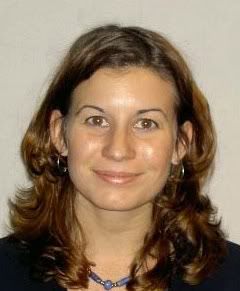|
Mainstreaming "Quiverfull"
In terms of very general demographics, I described Quiverfull families like this:
In the past two months, Quiverfull has enjoyed a good deal of press, comparatively speaking; not just in the blogosphere but in mainstream media outlets such as Newsweek, abcnews.com and, last Thursday night, TV magazine Nightline , which focused more than half of its program on the 10-person Carter family in Nashville, Tenn. The program was equal parts humorous wonder at the Carter family's "Cheaper by the Dozen" antics, and tepid questioning of the movement's inherent sexism, outspoken support for patriarchal family structures, and its health implications of Quiverfull moms. Larger questions about the social and political implications of Quiverfull were left unexplored. One such unexplored avenue is the significance of the Carters' family member, Nancy Campbell: an intensely influential figure in Christian women's movements, but one rarely recognized as such by the secular press. As it happens, I interviewed Mrs. Campbell last October while researching a book on conservative Christian women, and found her to be everything she appeared on Nightline: genteel, gracious, eloquent and warm. But this 30-year veteran of international culture wars and editor of the equally-veteran anti-feminist magazine Above Rubies, is also quite a bit more than the "Quiverfull grandma" that Nightline called her. Through her international magazine and ministry, Campbell has been pivotal in "restoring" a vision of "traditional" family life that takes square aim at the fruits of the women's liberation movement by encouraging evangelical women to emulate a past that never was. There's a scary side to Quiverfull too, as dramatically spelled out in the literature of its own founders. As I wrote in The Nation: After arguing Scripture, the Hesses point to a number of more worldly effects that a Christian embrace of Quiverfull could bring. "When at the height of the Reagan Revolution," they write, "the conservative faction in Washington was enforced [sic] with squads of new conservative congressmen, legislators often found themselves handcuffed by lack of like-minded staff. There simply weren't enough conservatives trained to serve in Washington in the lower and middle capacities." But if just 8 million American Christian couples began supplying more "arrows for the war" by having six children or more, they propose, the Christian-right ranks could rise to 550 million within a century ("assuming Christ does not return before then"). They like to ponder the spiritual victory that such numbers could bring: both houses of Congress and the majority of state governor's mansions filled by Christians; universities that embrace creationism; sinful cities reclaimed for the faithful; and the swift blows dealt to companies that offend Christian sensibilities. "With the nation's low birth rate, the high divorce rate, an un-marrying and anti-child viewpoint, and a debauched nation perhaps unable to slow down the spread of AIDS, we can begin to see what happens politically. A half-billion person boycott of a company which violated God's standards could be very effective.... Through God's blessing we would be part of a replay of Exodus 1:7, 'But the sons of Israel were fruitful and increased greatly, and multiplied, and became exceedingly mighty, so that the land was filled with them.'" "Brethren," they write, "it's time for a comeback!" But neither these extremist musings, nor the less-ambitious, but still seriously fundamentalist implications of Quiverfull's rise caught Nightline's notice. Nightline's failure to further explore the political nature not only of the general Quiverfull movement, but especially omitting the lifelong activism of the subjects they chose to personify that movement, demonstrates some of the key problems in a lot of religion reporting: depoliticizing grassroots movements until they appear strictly "personal" decisions, beyond intrusion, and failing to recognize that the complexity and factionalization of grassroots movements is a testament to its very strength. In lieu of such investigations, journalism often succumbs to the temptation to either divide all subjects faith-related into categories "Good," "Bad," and quirkily irrelevant - Quiverfull, in Nightline's taxonomy, falls somewhere between the quirky obsolete, and the "to be watched." - or else, in the guise of "fair balance," giving lip-service to two "sides" of an issue without really delving into either one. Ironically, it's moral relativism - that bete noir of Christian conservatism - at its best, and the pinnacle of such a lightweight treatment of serious movements like Quiverfull is upcoming again on ABC. This past week I was forwarded an email by one of the network's casting directors, who has put out an open call for "wholesome Quiverfull families" willing to participate in an upcoming episode of "Wife Swap" in order to display their superior family values to the nation and receive a $20,000 honorarium for their troubles. Cheap laughs for the coasts, and cheap blessings for the heartland - an accurate representation of a movement this is not. What flippant takes such as these fail to understand, or communicate, is that movements such as Quiverfull are different from the mainstream anti-abortion movement mainly in the level of their intensity, not in their foundational beliefs. (As illustration of how well within-the-fold many of their beliefs actually are, consider the text of an abortion ban on the table in Georgia. ) Quiverfull believers aren't "crazy extremists," so much as firm believers who have taken widely-shared conservative convictions to their logical ends. As purists within the larger anti-abortion/pro-family movement, they aren't fringe eccentrics, but a vanguard: representing the sort of society conervatives reference in condemning liberal, modern society. Journalism that covers such a complex ideological movements either as puffy human interest stories, or subjects them to judgment- (and idea-) free "balance," is not just intellectually lazy, but also potentially harmful, obscuring a forest-sized political agenda behind the novelty of its individual trees.
Mainstreaming "Quiverfull" | 199 comments (199 topical, 0 hidden)
Mainstreaming "Quiverfull" | 199 comments (199 topical, 0 hidden)
|
||||||||||||
| ||||||||||||




 print page
print page
 In November, I published
In November, I published  Quiverfull parents try to have upwards of six children. They home-school their families, attend fundamentalist churches and follow biblical guidelines of male headship--"Father knows best"--and female submissiveness. They refuse any attempt to regulate pregnancy. Quiverfull began with the publication of Rick and Jan Hess's 1989 book, A Full Quiver: Family Planning and the Lordship of Christ, which argues that God, as the "Great Physician" and sole "Birth Controller," opens and closes the womb on a case-by-case basis. Women's attempts to control their own bodies--the Lord's temple--are a seizure of divine power.
Quiverfull parents try to have upwards of six children. They home-school their families, attend fundamentalist churches and follow biblical guidelines of male headship--"Father knows best"--and female submissiveness. They refuse any attempt to regulate pregnancy. Quiverfull began with the publication of Rick and Jan Hess's 1989 book, A Full Quiver: Family Planning and the Lordship of Christ, which argues that God, as the "Great Physician" and sole "Birth Controller," opens and closes the womb on a case-by-case basis. Women's attempts to control their own bodies--the Lord's temple--are a seizure of divine power.